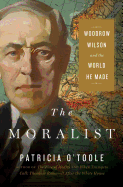
Historians have long viewed Woodrow Wilson as one of the most enigmatic men to occupy the White House. In The Moralist: Woodrow Wilson and the World He Made, Pulitzer Prize finalist Patricia O'Toole (The Five of Hearts) posits that much of Wilson's puzzling behavior can be explained by his medical history.
Well researched and insightful, The Moralist will appeal to those seeking a broader understanding of the 28th president and why his moralistic world vision was rejected by the American people and the world. O'Toole chronicles a series of early strokes that Wilson suffered--one as early as 1896--and theorizes that he may have had at least a dozen more. More concerning to O'Toole than the exact number is the frequency. Such repeated traumas indicate serious neurological problems that left Wilson medically compromised upon assuming office in 1913. O'Toole believes those previous strokes--and not the catastrophic event in 1919--contributed to Wilson's weakened presidency.
Many researchers and physicians now cite stress as a mitigating factor for many medical conditions. O'Toole concurs, noting that political agita preceded Wilson's strokes. "The pattern with Wilson was very typical: political crisis, physical illness, followed by seclusion." His succession of strokes left him irritable and "psychologically inflexible," major factors in his unwillingness to compromise with Congress or Cabinet members. This, O'Toole argues, led to the ultimate failure of Wilson's peace goals after World War I and impaired his abilities as a global world leader. --William H. Firman Jr., historian and writer

